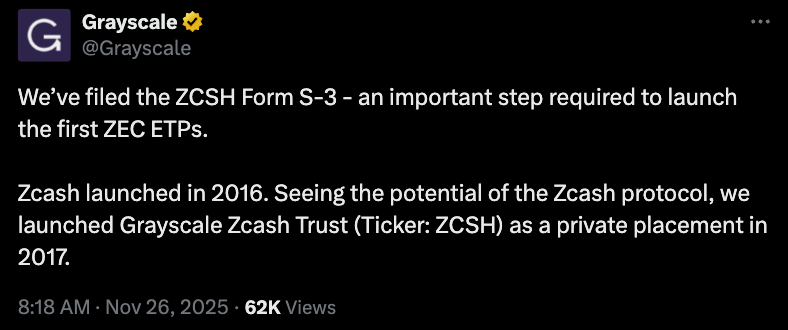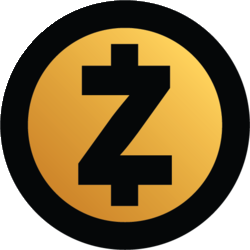Grayscale Moves to Convert Zcash Trust into Potential Spot ETF
ZEC/USDT
$444,176,201.48
$223.96 / $203.50
Change: $20.46 (10.05%)
+0.0004%
Longs pay
Contents
Grayscale Investments has filed with the SEC to convert its Zcash Trust into a spot ETF, potentially the first linked to a privacy coin like Zcash (ZEC). This follows approvals for Bitcoin, Ether, Dogecoin, and XRP ETFs, aiming to list on NYSE Arca amid ZEC’s recent 50% monthly price surge.
-
Grayscale’s Filing: Submitted Form S-3 to SEC for Zcash ETF conversion.
-
Privacy Coin Pioneer: Could be the first ETF tied directly to Zcash for enhanced transaction privacy.
-
Market Impact: ZEC price up over 50% in 30 days and 1,050% in 12 months, reaching $519.62 per Nansen data.
Discover Grayscale Zcash ETF filing details and implications for privacy coins in 2025. Explore how this spot ETF could boost ZEC adoption—stay informed on crypto investments today.
What is the Grayscale Zcash ETF and How Does It Work?
Grayscale Zcash ETF represents Grayscale Investments’ effort to transform its existing Zcash Trust into a spot exchange-traded fund, providing investors direct exposure to Zcash (ZEC) cryptocurrency. Filed via a Form S-3 registration statement with the U.S. Securities and Exchange Commission on Wednesday, this initiative builds on Grayscale’s successful launches of spot ETFs for Bitcoin (BTC), Ether (ETH), Dogecoin (DOGE), and XRP (XRP). The ETF would track the real-time price of ZEC, a privacy-focused digital currency, allowing traditional investors to gain access without managing wallets or keys themselves.
Why Is Grayscale Pursuing a Zcash ETF Now?
Zcash, launched in 2016 as a fork of Bitcoin, emphasizes privacy through features like zk-SNARKs technology, which enables shielded transactions hiding sender, receiver, and amount details while maintaining blockchain verifiability. Grayscale’s move comes after the SEC approved spot Bitcoin ETFs in January 2024, spurring a wave of crypto-linked products from major firms. According to data from Nansen, ZEC’s price has surged more than 50% over the past 30 days and an impressive 1,050% in the last 12 months, hitting $519.62 at publication time. This momentum, coupled with growing institutional interest in privacy solutions amid regulatory scrutiny on transparent blockchains, positions the ETF as a timely offering.
The filing specifies potential listing on NYSE Arca, a major exchange already hosting Grayscale’s other crypto ETFs. Industry observers note that such products democratize access to niche assets like Zcash, which has a market cap exceeding $10 billion in recent valuations. ETF analyst Eric Balchunas commented on social media that privacy coins like Zcash might attract users seeking alternatives to Bitcoin’s public ledger, though he acknowledged skepticism from traditional Bitcoin supporters who prioritize transparency.
Grayscale’s strategy aligns with broader trends: since the Bitcoin ETF approvals, asset managers like Bitwise and BlackRock have filed for Ether and other spot products, with Grayscale itself debuting a Dogecoin ETF this week that recorded $1.4 million in trading volume on its first Monday. For Zcash, the ETF could enhance liquidity and legitimacy, drawing in pension funds and retail investors wary of direct crypto holdings. However, approval remains subject to SEC review, which has historically scrutinized privacy coins for potential illicit use, though Zcash’s optional privacy features mitigate some concerns.

Source: Grayscale
The fund’s structure would mirror Grayscale’s Bitcoin ETF, holding actual ZEC tokens in custody while shares trade on the exchange. This spot model, unlike futures-based ETFs, ensures closer price tracking to the underlying asset. Experts from firms like Bloomberg Intelligence highlight that privacy ETFs could fill a gap in diversified crypto portfolios, especially as global regulations evolve to balance innovation with compliance.
Institutional adoption signals strength: earlier this month, Leap Therapeutics announced a $50 million investment from Winklevoss Capital—founded by Gemini exchange creators Cameron and Tyler Winklevoss—to acquire ZEC tokens for its treasury. This move underscores Zcash’s appeal for secure, private holdings in corporate strategies. Balchunas further noted in his analysis that enhanced privacy might shift some “traditional Bitcoiners” toward Zcash, sparking debates on social platforms about the trade-offs between anonymity and auditability in blockchain ecosystems.
Frequently Asked Questions
What Does Grayscale’s Zcash ETF Filing Mean for Investors?
Grayscale’s Zcash ETF filing offers investors a regulated way to buy into Zcash without direct crypto management, potentially listing on NYSE Arca post-SEC approval. It follows the firm’s Dogecoin and XRP ETF launches, capitalizing on ZEC’s 50% recent price gain. This could increase Zcash’s mainstream accessibility while exposing it to traditional finance scrutiny.
Is Zcash a Better Privacy Option Than Bitcoin for ETF Investments?
Zcash provides superior privacy via zk-SNARKs for optional shielded transactions, unlike Bitcoin’s fully transparent ledger that exposes all details. For ETF investors, a Grayscale Zcash product would deliver this benefit through a familiar stock-like vehicle. As voice search queries on crypto privacy rise, Zcash stands out for balancing anonymity with regulatory compliance in spot ETF formats.
Key Takeaways
- Historic Filing: Grayscale’s Form S-3 for Zcash ETF could pioneer privacy coin investment products in the U.S.
- Price Surge Support: ZEC’s 1,050% yearly increase, per Nansen, bolsters the case for spot ETF approval amid market enthusiasm.
- Institutional Momentum: Backed by investments like Winklevoss Capital’s $50 million ZEC buy, signaling growing corporate interest in privacy tech.
Conclusion
Grayscale’s push for a Zcash ETF underscores the expanding role of privacy coins in mainstream finance, following spot ETFs for Bitcoin, Ether, Dogecoin, and XRP. With ZEC’s robust performance and features like zk-SNARKs addressing privacy needs, this filing could pave the way for innovative investment options. As the SEC reviews progress, investors should monitor developments closely, preparing for potential shifts in crypto portfolio strategies that prioritize secure, anonymous transactions in an increasingly regulated landscape.
